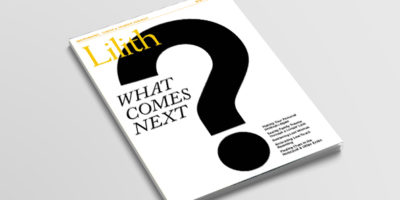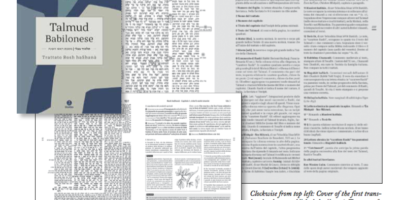Saluting Rare Small Victories for Women in the Talmud
Fifty Shades of Talmud by Maggie Anton (Banot Press, $6.95) is bathroom reading that you can’t take with you to the bathroom. It is all about sex, true, but it is also all about Talmud, and as the very same rabbis quoted in her book taught, it is forbidden to study matters of Torah in the bathroom. Nonetheless, it is worth finding a place to peruse this slim volume in which Anton compiles fifty Talmudic discussions about every aspect of sexual relations. These discussions are interspersed with black-and-white cartoons featuring Adam and Eve and rabbis in togas, as well as pithy quotes about sex, many of them—like many of the statements in the Talmud—anonymous, and others attributed to luminaries ranging from Voltaire to Gandhi to Woody Allen.
The Talmudic voices quoted in this book are also interlaced with Anton’s own irreverent speculations, such as the possibility that Ben Azzai—the sage who declared that he did not have children because “my soul craves Torah”—may in fact have “craved one of his rabbinic colleagues rather than his wife.” Anton knows her sources well—she is also the author of two novels fictionalizing the life of a Babylonian Talmudic sage and his family members, as well as the Rashi’s Daughters series about the preeminent commentator on the Bible and Talmud. In those novels, she tried to recreate the ancient and medieval worlds of her subjects, though her historical fictions were inevitably inflected by her modern sensibilities. Anton’s own sensibilities are even more apparent in Fifty Shades, where she salutes those “rare small victor[ies] for women’s rights” and is quick to call the rabbis on instances of “TMI.”
Anton’s book will rob readers of the pleasure of stumbling upon these texts unexpectedly in their Talmudic contexts. Lacking this context, we miss out on significant linguistic resonances such as the notion that the same term is used for climaxing sexually and for entering or “coming” into the Temple, two acts that the rabbis deliberately juxtapose. But for those who would not otherwise open a volume of Talmud, Anton’s book offers, perhaps, a titillating way in. “Rabbis are men, too,” she asserts, laying bare many rabbinic views on sexuality that may seem surprisingly progressive to the uninitiated. She shows how the rabbis were encouraging of good sex, and very permissive when it came to what a married couple may do in bed. She explores rabbinic views on female orgasms, on the relationship between sex acts and the nature of the children born, and on a wife’s conjugal rights. Throughout the book, she explains the metaphors and euphemisms the Talmudic rabbis used to refer to sexual matters, from “using the bed” to “overturning the table” to body parts such as the “lower face” and “that place.”
But Anton herself does not often resort to metaphor, and her expose of Talmudic texts that “sound more like they belong more in a locker room than in a seminary” is bawdy and bold. In spite of the pious-looking prayer shawl on the jacket, hers is not a book I’d want to be caught reading in public. Since I also can’t read it in the bathroom, I opted instead to lay down with it in bed, hopeful that the rabbis would not have disapproved of my way of “using the bed.”
Ilana Kurshan is the author of the memoir If All the Seas Were Ink, forthcoming in 2017 from St. Martin’s Press.





